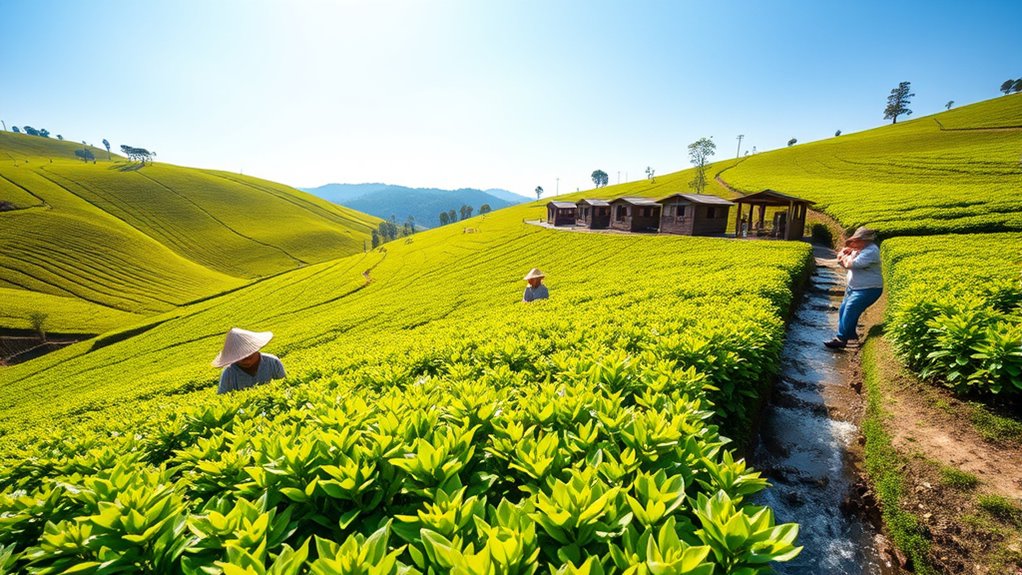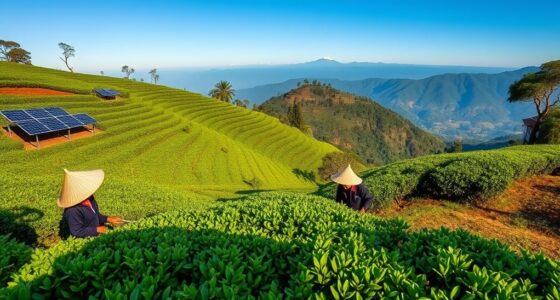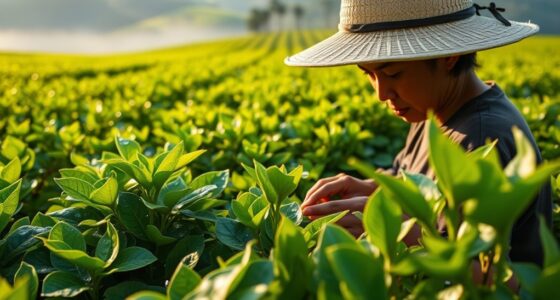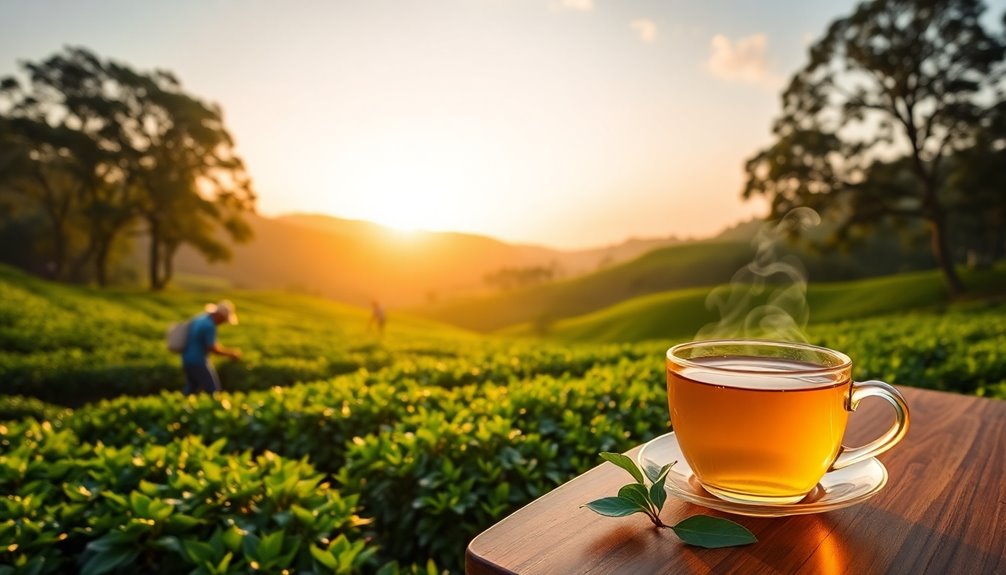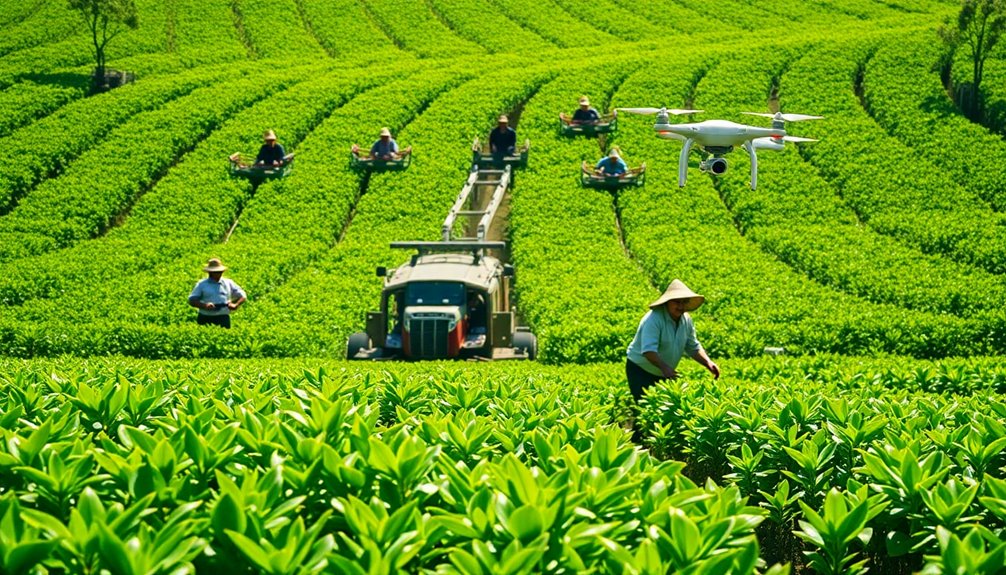Explore case studies where tea companies prioritize sustainability and ethics through certifications like Fair Trade and Organic. These examples show farmers earning fair wages, practicing eco-friendly farming, and supporting community development. By choosing certified teas, you help promote fair treatment and environmental health. For instance, some brands have successfully combined fair pay with organic methods, encouraging industry-wide shifts. Keep exploring to discover how your choices can make a real difference in the tea industry.
Key Takeaways
- Examples of tea producers successfully implementing dual Fair Trade and Organic certifications to promote ethical and eco-friendly farming.
- Case studies highlighting community benefits and improved living standards resulting from certified sustainable tea practices.
- Instances of farmers adopting crop rotation, water conservation, and organic pest control methods within certified programs.
- Industry collaborations that have increased market demand for ethically sourced and environmentally sustainable teas.
- Impact assessments demonstrating how certification standards enhance biodiversity, soil health, and long-term tea production sustainability.
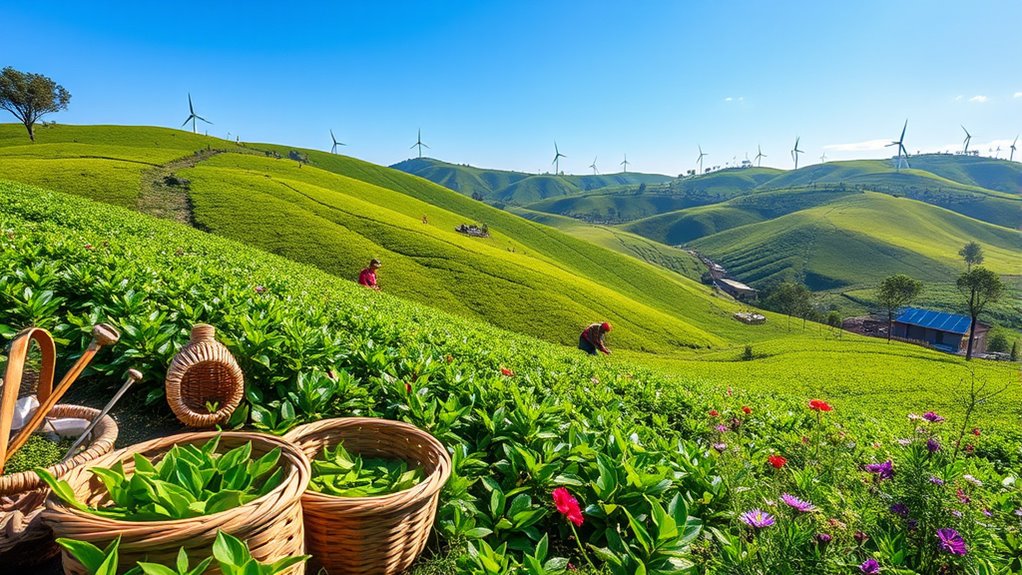
As tea lovers become more conscious of their choices, sustainable and ethical sourcing practices are gaining importance. You’re increasingly seeking teas that support fair treatment of farmers and respect environmental standards. One prominent approach is Fair Trade certification, which guarantees that farmers receive fair wages and work under decent conditions. When you choose Fair Trade-certified teas, you’re helping promote equitable trading relationships, ensuring that growers aren’t exploited, and that communities benefit directly from your purchase. This certification also encourages farmers to adopt sustainable farming practices, which often include measures to conserve water, reduce chemical use, and protect biodiversity. By supporting Fair Trade, you’re actively contributing to a more just and sustainable tea industry.
Choosing Fair Trade teas supports fair wages, sustainable farming, and a healthier planet.
Another critical aspect is Organic certification. When you see organic labels on tea packages, it indicates that the tea has been produced without synthetic pesticides, herbicides, or genetically modified organisms. Organic certification ensures that farmers follow strict guidelines, prioritizing soil health, reducing chemical runoff, and minimizing environmental impact. Choosing organic teas not only benefits your health by avoiding potentially harmful residues but also promotes eco-friendly farming practices. These methods tend to be more sustainable, helping to preserve ecosystems and maintain biodiversity. Organic certification often involves rigorous inspections, which means your tea has been produced with transparency and accountability. This reassures you that the product aligns with your values of environmental responsibility and health consciousness.
Many tea companies now prioritize sourcing from farms that hold both Fair Trade and Organic certifications. This dual approach ensures that the tea is ethically produced and environmentally sustainable. By opting for such products, you support farmers who are paid fairly and who farm in ways that protect the planet. These practices often include crop rotation, organic pest control, and water conservation—all critical for long-term sustainability. Additionally, sustainable farming practices play a vital role in maintaining healthy ecosystems and ensuring the longevity of tea production. As a consumer, your choice influences the market, encouraging more producers to adopt these standards and elevating the overall quality and integrity of the tea supply chain.
Ultimately, by paying attention to certifications like Fair Trade and Organic, you’re making a conscious decision that aligns with your values. You’re not just enjoying a delicious cup of tea; you’re actively participating in a system that values fairness, environmental health, and sustainability. Your choices can drive positive change in the industry, ensuring that future generations can enjoy tea that’s produced with respect for people and the planet. So, next time you pick up a box of tea, look for those certifications—your mindful selection makes a meaningful difference.
Frequently Asked Questions
How Do Certifications Ensure Genuine Ethical Practices in Tea Sourcing?
Certifications guarantee genuine ethical practices in tea sourcing by verifying certification validity and enforcing strict standards. When you see a certified label, you’re assured the producer adheres to ethical compliance, such as fair labor practices and environmental sustainability. These certifications are regularly audited, holding growers accountable. This transparency helps you make informed choices, supporting ethical sourcing and encouraging the industry to prioritize sustainable, responsible practices across the supply chain.
What Challenges Do Small Farmers Face in Sustainable Tea Production?
Ironically, small farmers often struggle despite their crucial role in sustainable tea production. You might think their biggest challenge is access to markets, but it’s actually maintaining farmer livelihoods. Crop diversification, which could boost income and resilience, is tough due to limited resources and knowledge. Without support, these farmers face hardships that threaten both their livelihoods and the environment, highlighting the urgent need for greater investment in small-scale sustainable practices.
How Can Consumers Verify the Ethical Claims of Tea Brands?
You can verify the ethical claims of tea brands by looking for third-party audits and traceability systems on their packaging or websites. These tools guarantee the company’s claims are independent and transparent. Research the certifications they hold, such as Fair Trade or Rainforest Alliance, and check if they provide detailed information about their supply chains. Being proactive helps you make informed choices and support genuinely ethical brands.
What Is the Environmental Impact of Organic Versus Conventional Tea Farming?
Organic tea farming drastically reduces environmental damage, saving the planet from near-total soil degradation and water wastage. You’ll notice healthier soil and better water conservation, unlike conventional methods that drain resources and harm ecosystems. Organic practices avoid harmful chemicals, protect wildlife, and promote sustainability. By choosing organic, you help prevent environmental catastrophe, ensuring cleaner water and soil, and a healthier world for future generations—making your tea choice a powerful act of environmental stewardship.
How Do Fair Trade Practices Benefit Local Tea-Growing Communities?
Fair trade benefits your local community by ensuring fair wages, safe working conditions, and community development projects. When you support fair trade practices, you help improve living standards and empower farmers to invest in their land and education. This creates a more sustainable local community, fosters economic stability, and promotes ethical harvesting methods. By choosing fair trade tea, you directly contribute to a positive impact on the people who grow your tea.
Conclusion
By choosing sustainable and ethical tea, you support fair wages, protect the environment, and promote community well-being. By prioritizing transparency, you foster trust and accountability. By embracing responsible sourcing, you help preserve traditions, empower farmers, and ensure future generations can enjoy tea. Your choices matter—your actions can make a difference. Together, through mindful consumption, you contribute to a world where tea is not only enjoyed but also ethically produced and sustainably nurtured.

